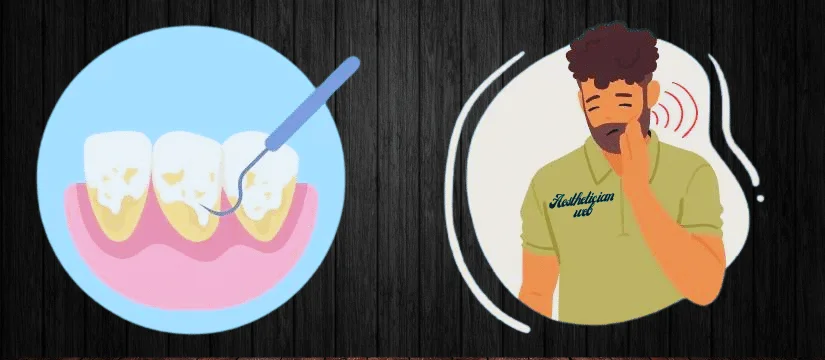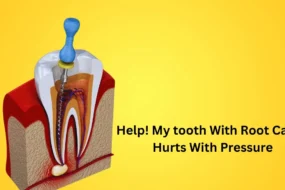
Have you heard the horrific tale of the fatal tooth infection? Tooth infections appear like something out of a horror movie and may be fatal. This troubling article will explain how long it takes to die from a tooth infection. We will investigate the dangerous potential of these seemingly benign oral conditions, from learning about the sneaky nature of cavities to grasping how they may travel outside of the mouth and cause havoc on essential organs.
Understanding Tooth Infection
If left untreated, tooth infections can cause serious discomfort and risk one’s health. Tooth infections can offer substantial concerns that often go unnoticed by those who view them as trivial issues.
Heart valve infections are among the potentially fatal side effects of these diseases that can spread to other regions of the body.
There is an elevated danger that tooth infections will move outside the mouth and damage other important organs. Due to the teeth’s close connection to vital organs such as the blood, arteries, and nerves, an untreated infection might have systemic effects.
Furthermore, research suggests that chronic oral infections may increase the risk of finding conditions such as diabetes and heart disease. Knowing these possible risks underlines the importance of receiving timely care and appropriate oral hygiene to avoid later, more profound health consequences.
Causes of Tooth Infections
- One of the primary causes of tooth infections is untreated dental decay. Bacteria can break through the enamel and reach the root of cavities if delayed treatment results in an excruciating illness.
- Another frequent offender is inadequate dental hygiene, which fosters the growth of harmful microbes and inflames the gums, perhaps resulting in infections and abscesses.
- In addition, poor gum health and a decreased immune system can increase people’s vulnerability to tooth infections by reducing the ability to fight off bacterial invaders. These disorders include diabetes and immune system weakness.
- Oral damage can also result in tooth infections. Sports dental injuries can serve as an opening for microorganisms to enter the body and, if ignored, result in an infection. People must take preventative stages, such as using mouthguards when staying active, to shield their teeth from harm.
Progression of Tooth Infection
If treatment is not received, the course of tooth infections is a complicated and frequently misinterpreted process that can have significant consequences. A slight gum infection or cavity can quickly worsen, affecting not just the tooth but also the tissues around it and possibly even spreading to other areas of the body. Maintaining good dental health and preventing potentially fatal consequences need an understanding of this development.
The effect of dental infection development on general systemic health is one factor that is frequently disregarded. Studies have progressively established the connection between prolonged oral infections and systemic health conditions, such as diabetes, respiratory disorders, and cardiovascular disease.
The relationship between general and oral health highlights how crucial it is to get treatment for dental problems as soon as possible, no matter how little. As infections worsen, they may cause excruciating pain, edema, and, in rare situations, the development of an abscess.
More complex care like root canal therapy or tooth extraction can be necessary when an infection gets to this point. Neglecting early indications of illness can also harm neighboring teeth and bone structure, which might cause further issues later on.
Symptoms of Advanced Tooth Infection
- Several upsetting symptoms may indicate an advanced tooth infection and the need for skilled dental care. Severe, ongoing pain in the afflicted tooth or surrounding region is one typical sign. When biting or exerting pressure on the tooth, this discomfort may get more lavish and even radiate to the jaw, neck, or ears.
- Furthermore, severe infections can leave the tongue with a persistently unpleasant taste and a more significant reaction to hot or cold foods and beverages. Fever and a general feeling of unwellness may appear along with facial and gum edema as the infection worsens.
- In certain situations, people may find it difficult to open their lips entirely due to jaw muscle irritation. Additionally, noticeable sores on the gums or leakage around the impacted tooth might be signs of severe dental infections.
- If routine dental hygiene measures do not alleviate persistent foul breath, it might indicate a more severe illness. These symptoms are essential warning indicators that demand immediate dental expert assessment to avoid more difficulties.
Medical Treatment Options
The medical management of dental infections has advanced dramatically in recent years, providing patients with a wide range of valuable options. One of the best option is root canal therapy, which comprises cleaning the tooth’s interior of damaged tissue and sealing it to prevent infection. This technique keeps the original tooth untouched while relieving the discomfort caused by the disease.
Dental implants are an additional modern therapy option that provides a permanent fix for incurable serious tooth infections.
With implants, aesthetically pleasing tooth replacement that restores the function and appearance of their smile. Addentially, advances in antibiotic therapy have improved the care of acute tooth infections by focusing on the specific bacteria causing the illness.
In summary, individuals with severe dental infections now have renewed hope thanks to these modern facilities’ medical treatment choices. Patients may enhance their overall and oral health by making educated choices and keeping up to date on recent developments in dental care.
Potential Consequences and Complications
Serious issues might arise from tooth infections. If the infection spreads from the tooth to the surrounding tissue, it might cause an unsightly abscess.
Severe infections can spread to other body parts through the circulation, leading to systemic disease and possibly deadly conditions. In addition, untreated dental infections raise the risk of tooth loss by weakening the jaw’s bone.
Among other disorders, a history of recurrent tooth infections has been linked to an increased risk of respiratory and heart problems. Prolonged oral infections can lead to systemic health issues and weakened immunity by triggering an inflammatory response. People with tooth infections should seek dental treatment as soon as possible and follow their dentist’s advice to avoid consequences that last on oral and overall health.
In conclusion, awareness of the possible repercussions and issues of oral infections emphasizes how critical prompt dental treatment is. Taking care of these problems early can prevent serious health consequences from untreated mouth infections and dental difficulties. Maintaining proper oral hygiene and getting prompt medical attention for any infections is essential.
Conclusion
In conclusion, if a tooth infection is not treated, it may worsen and spread to other body areas. Even tooth infections seldom result in death, seeking dental treatment as soon as possible is vital due to the danger of major systemic infections and many consequences.
Individuals who maintain good oral hygiene and schedule regular dental inspections can reduce their risk of developing potentially deadly tooth infections. Remember that treating oral issues early on can help stop them from getting worse and posing a major threat. Make your dental health a priority right now—don’t delay!
She writes to dispel myths, encourage wellness practices, and promote good lifestyle choices. Dr. Lisa Robert writes to leave a lasting impression on her readers’ health and well-being.





